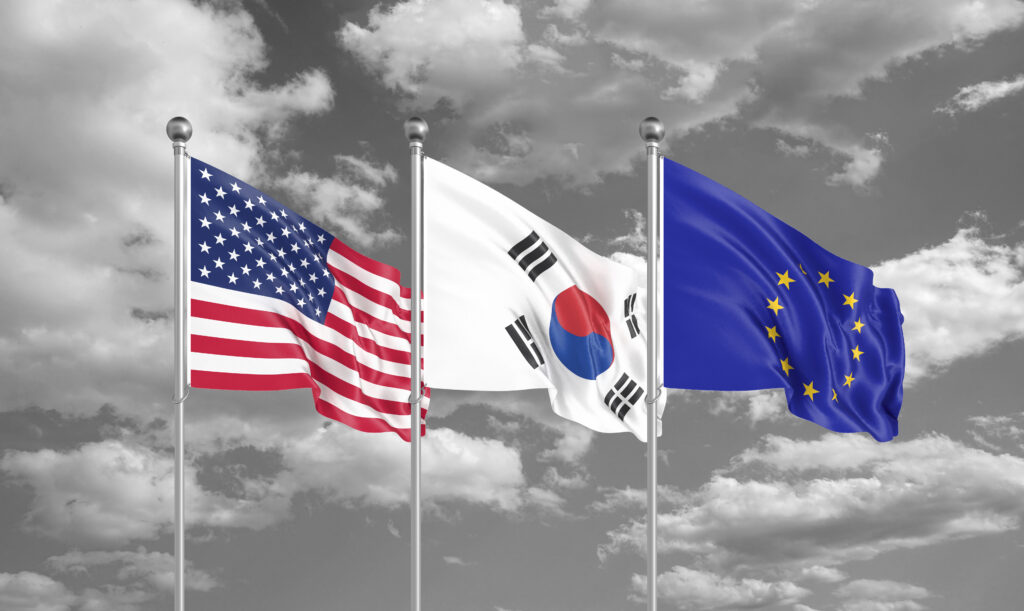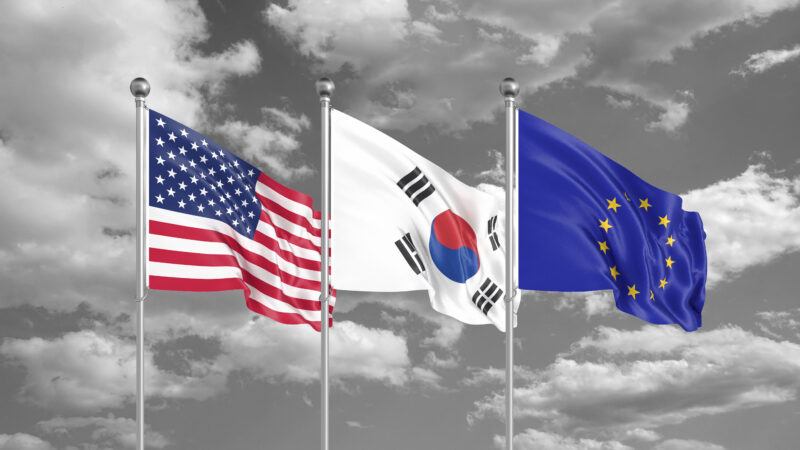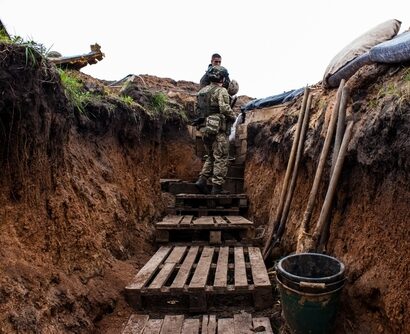Abstract: In meeting the prime concern of South Korea, the EU needs more engagement beyond “critical” engagement on the Korean peninsula to work towards peace and denuclearisation. While this can contribute to avoiding a situation in which Seoul sees itself sucked into the Chinese orbit, it is also in the interest of the EU as security is indivisible and helps the EU to foster its standing as a global political player, which is still measured in political and military terms in addition to economic weight. The EU-Korea Strategic Partnership, drawing on a solid legal framework, can contribute to the promotion of global governance (climate change, open trading system) based on multilateralism and the rule of law.
Problem statement: Are the EU and South Korea too far apart and too different to give more life to their Strategic Partnership? What if the EU brokered a peace agreement with North Korea, like in the case of Iran, with all partners on board?
So what?: South Korea is a strong ally of the Western hemisphere in a demanding environment. A revamped Strategic Partnership will contribute to building global governance founded on the rule of law and multilateralism.

The 70th anniversary of the outbreak of the Korean War in 2020 served as a grim reminder that the Korean Peninsula remains one of the global security hotspots in line with Taiwan, Hongkong, South and East China Sea and Afghanistan. The coincidence between the 70th anniversary of the Korean War and that of the Schuman Declaration highlights the contrast between the peaceful system of international relations in the EU and the mistrust and reliance on military force that persists in East Asia. South Korea is technically still at war.
While the EU is South Korea’s third or fourth largest trading partner and European companies are the largest source of investment, recognition and standing as a global political player particularly in Asia are still measured according to military and political parameters. Economics is crucial but not enough to be one of the big players – geo-economics is just one part of geo-politics.
The main players in and around the Korean Peninsula are
- the US, the military ally and security guarantor of Korea and Japan as well Taiwan;
- China, with centuries of knowhow on how to put pressure on Seoul, now its number one trading partner with a pivotal role in influencing North Korea,
- Japan, with a certain love-hate relationship with the later dominating lately because of the unsolved legacy of the past, centred on the issue of victims of wartime sexual slavery and – more pressing – forced labour,
- Russia, primarily a supplier of energy and to reckon with as a regional power which does not want to be overlooked although it plays second fiddle to China.
South Korea enjoys peace and prosperity but lives in a rough neighbourhood:
- The potential for an explosion or implosion of North Korea cannot be completely ruled out.
- South Korea sits juxtaposed between the United States, China, Russia and Japan, major powers with different values and approaches to the international system.
- Two of them, China and the US, are in great power competition epitomised by a trade war.
- The alliance with the United States is strained while historical factors prevent the building of a trilateral alliance with Japan that could extend to Australia and New Zealand, also as part of middle-power cooperation. In this context, one is reminded of the old saying that a chain is as strong as its weakest link.Given the current great power conflict, an increasingly assertive China and rising tensions around Hong Kong and Taiwan and the South China Sea this is a time when the chain of the alliances needs to be strengthened, not weakened.
The EU is no onlooker in this development: the security of Asia and Europe are intertwined.
EU – Korea
The contractual basis and infrastructure for the EU’s Strategic Partnership with South Korea rests on a solid basis:
- A Political Framework agreement allows for more than 30 bilateral dialogues,
- a successful free trade agreement (FTA) supports trade and investment (+50% volume in 10 years);
- a Framework Agreement for security cooperation provides the basis to work together in crisis hit areas of the world. Korea´s cooperation should be enlarged beyond its participation in the anti-piracy operation ATALANTA off the coast of Somalia. This should get a stimulus through the implementation of the policy actions outlined in the policy paper Enhanced Security Cooperation in and with Asia[1].
The tenth anniversary of the EU-Korea Strategic Partnership in 2020[2] is a good occasion to refocus and intensify. This the more, as the EU a Strategic Partnership is not just an honorary title but a recognition that a partner has the means to work with the EU in addressing issues of global significance. Four of the eleven strategic partnerships of the EU are with Asian countries (South Korea, India, China, Japan) and ASEAN. Strategic Partners cooperate not only bilaterally but also in the interest of defending the global commons, based on shared interests.
However, in order for the EU-Korea Strategic Partnership is to bear fruit, two axioms need to be implemented: 1) The EU must devote adequate high-level attention and avoid “Korea Passing”; 2) South Korea must stop taking the EU for granted as a non-troublemaker.
While the South Korean concentration on peace on the peninsula and stable relations with the surrounding great powers is understandable and necessary, South Korea is no longer the shrimp between whales[3], e.g., the object of its neighbours’ politics. This is due to the hard work and sacrifices of the post-war generation, which turned South Korea into one of the world’s top ten economies. This status confers responsibility, not only admiration and honours. Furthermore, South Korea´s vibrant democracy has long set an example to the rest of the world, the candle-light movement leading to President Park’s impeachment and a high turnout for the first nationwide election held despite the COVID 19 pandemic. Importantly, South Korea has shown that human rights are universal values not only Western conceptions.
However, no matter how successful Korea is, it cannot do it alone and it cannot take this achievement for granted. Korea’s peace and prosperity ultimately depend on a global system of respect for the rule of law that rests on strong cooperation through multilateral institutions with UN in general and the International Atomic Energy Agency in view of denuclearisation in particular.
Nowadays South Korea has the means to make a difference on issues of a global dimension. The international community needs middle powers such as South Korea not just to follow, but to take the lead in supporting the rule of law and multilateralism. This sometimes comes with a price tag: it is not possible to please all the time all partners, important as they may be for the political situation on the Korean Peninsula.
If there is no strong support for the rule of law and multilateralism, the undermining of the international system during recent years could take hold and cast a dark shadow on North East Asia’s chances of sustainable peace and prosperity. Korea had learned to appreciate this early: The 1950 UN Security Council Resolution in reaction to the North Korean invasion of South Korea was, in some parts, an early example of countries recognising that the undermining of peace and security in one part of the world undermines the system as a whole.
South Korea sees the EU as its most like-minded partner in terms of the commitment to solve the North Korean nuclear issue through peaceful means. The EU’s commitment to ensuring the rule of law in implementing UN Security Council resolutions and its economic size means that the EU is a strong pillar in enforcing the sanctions intended to push Pyongyang back to the negotiating table.
The stalled process of negotiation goes against the interests of the EU. What is difficult for the South Koreans to understand is why the EU is not more willing to use its large array of instruments to pursue the engagement side of “critical engagement” policy vis-à-vis North Korea. The EU could play a more pro-active role beyond implementing sanctions in facilitating a resumption of dialogue[4]. This would have been easier if the EU had shown more engagement since stopping the political dialogue in 2015 in drawing on its assets ranging from its soft power to the presence of six Member States in Pyongyang.
When a new ball game starts under the Biden Administration, the EU needs to step forward as a player offering support and advice. A multilateral framework for negotiations could be of interest: While there is little appetite to relaunch the Six-Party-Talks, which would not be in the EU’s interest, a multilateral approach based on lessons learned in reaching the Iran Agreement and the Dayton Agreement before, could facilitate talks. Diplomacy has to become more innovative, overcoming old patterns which obviously have not produced sustainable results for decades.
The deeper the EU´s involvement in promoting peace, security and denuclearisation on the Korean Peninsula, the more leverage it will have in inviting South Korea to pull its weight on its interests in strengthening the multilateral system.
Two examples of how the EU-Korea Strategic Partnership can support common objectives:
The starting point is climate action. The colossal amounts that will need to be spent on economic recovery from the COVID-19 induced crisis present the opportunity to enter into a definitive transition towards a sustainable future and net-zero carbon emissions. Korea must not be a reluctant follower, but take the lead in climate action – setting and then moving towards ambitious targets. Korea’s economic development has long set an example for the developing world. Now is the time to lead on sustainable forms of development. Korea can become the first carbon-free country in Asia by 2050, if it focuses on this task, if it commits and develops a road map leading to this goal’s realisation. Getting out of coal is an important goal where Korea is, unfortunately, wavering which endangers reaching the 2050 goal. Like the EU investing in a green and not black economy would be honouring the responsibility for the Next Generation. In the domestic context, giving this generation hope and a perspective is essential, especially with a fertility rate of 0,9%.
The second point is encouraging South Korea to pull its weight in defending an open trading system and multilateralism. South Korea’s development would have been impossible without an open trading system – South Korea´s domestic market is too small; it lacks natural resources; it is part of the international value and production chains. Reshoring because of political and/or security considerations will prove difficult. Standing up for the rules-based international trading system has been and continues to be in South Korea´s own interests, not only when the Trade Minister eyes the position of the Director General of the WTO. Furthermore, respecting the rules of the bilateral FTA contributes to stability and security and grants protection from protectionism and promotes multilateralism.
Conclusion
Enhancing cooperation between the EU and South Korea has important strategic implications: In the re-configuration of power relations and competition in Asia, it is in the EU’s interests to work with South Korea towards common objectives as like-minded partners and avoid a situation in which Seoul sees itself sucked into the Chinese orbit.
This will be all the more the case if the relations with the so-called “iron-clad” alliance partner (the US) undermines the basis for the alliance and relations with Japan continue to deteriorate – a trend President Biden is expected to reverse. In implementing the mentioned 2018 Policy Paper on Enhanced Security Cooperation in and with Asia, Korea has been chosen as a pilot country focusing on cyber security, one of the areas where the EU and Korea share common security interests based on similar threat perceptions. A revamped Strategic Partnership with a wider coverage will contribute to building global governance founded in the rule of law and multilateralism.
The EU must intensify its engagement in addressing the challenges stemming from North Korea and bring its experience and know-how in crisis-management and conflict resolution to the table. The EU policy of “critical engagement” needs more engagement on the Peninsula and in wider East Asia. This is not only because of the indivisibility of security – the security of Asia and the EU are intertwined – but it is also necessary if the EU is to be taken seriously as a political and security actor in the region and beyond.
Dr. Michael Reiterer ([email protected]) Professor for International Security and Diplomacy, Brussels School of Governance; Adjunct Professor University of Innsbruck (habilitation 2005), Webster University/Vienna, LUISS/Rome, Danube University/Krems; Associate Fellow – Global Fellowship Initiative, Geneva Centre for Security Policy (GCSP), Senior Advisor – Centre for Asia Pacific Strategy, Washington DC; Ambassador of the European Union to the Republic of Korea (2017-2020), Switzerland and Liechtenstein (2007-2011) rtd.
[1] Council of the European Union, “Enhanced EU Security Cooperation in and with Asia-Council conclusions,” accessed February 03, 2021, https://www.consilium.europa.eu/media/35456/st09265-re01-en18.pdf.
[2] Michael Reiterer, “The 10th Anniversary of the EU-Korea Strategic Partnership,” VUB-IES Korea Chair Policy Brief, accessed February 03, 2021, https://www.korea-chair.eu/wp-content/uploads/2020/07/KFVUB_Policy-Brief-2020-09.pdf.
[3] Korean proverb: “A shrimp’s back breaks in a fight among whales”.
[4] Michael Reiterer, “The European Union and Security Cooperation: Bringing Northeast Asia into Focus,” Global Asia, The East Asia Institute (Seoul, 10 November 2020), DOI 10.1080/00323187.2019.1640070; https://www.globalnk.org/commentary/view?cd=COM000044.






